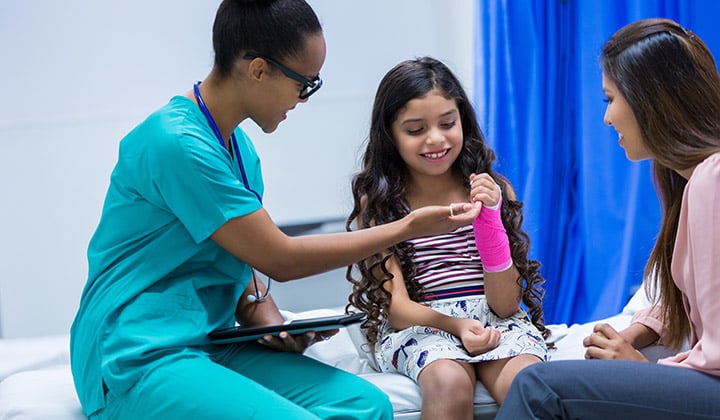Get updates
Have a parenting hack to share? Or a topic you'd like to see?
Pediatric emergency visits: what parents need to know

Summertime is in full swing! It’s time to be active outdoors and take advantage of longer days with swimming, outdoor dining, bicycling and more. This also means it’s time to use extra care in preventing injuries that could lead to an emergency department visit. Check out our summer safety tips to keep your kiddos having fun and out of the hospital.
If an emergency visit cannot be avoided, consider taking your child to a pediatric emergency department. We have all the information below on why pediatric-specific emergency departments are a great fit for kids.
What does a pediatric emergency department have that a general emergency department does not?
- Kid experts: Emergency departments like the ones at Children’s Mercy’s Adele Hall and Hospital Kansas campuses have pediatric emergency medicine specialists. Everyone specializes in the care of children, because kids have unique needs and need unique care.
- Child Life specialists: Health care for children is about more than finding the right medicine and procedures. It is also about providing age-appropriate information and making their visit as comfortable as possible. Child Life specialists improve patient and family coping, reduce the need for sedation for some medical procedures and lead to an overall more positive experience for the patient and family.
- Kid-sized equipment: Kids need smaller bandages, stethoscopes, blood pressure cuffs and other materials used at medical visits. Sometimes, adult hospitals won’t have the right sizes for littler bodies.
- Family-friendly supplies: Emergencies are, by nature, unplanned. If you show up to a Children’s Mercy emergency department without kid supplies you need, such as wipes, diapers or formula, don’t worry. We keep extras on hand. We also provide phone chargers on the walls and charger stands, so you’re able to stay connected to loved ones.
What is a pediatric emergency department visit like?
Understanding what to expect ahead of time can reduce stress when an emergency visit is necessary.
- Check in and security : First, you will stop at the front desk and the staff will ask for a few pieces of information such as ID. This is also where you go through a metal detector to ensure the security of all patients and staff.
- Triage : Next, you will check in with a triage nurse about why you are there. They will ask about your child’s medical history, current medications and allergies. The triage nurse will evaluate each case, and while there may be a wait, you will be seen with all concerns about your child addressed. A care assistant will get your child’s basic vitals such as heart rate, temperature, respiratory rate, blood pressure and weight.
- Important Note: If your child’s condition changes for the worse while you are waiting, it is important to update the triage nurse so they can properly prioritize your child’s care. They may also be able to alleviate discomfort or pain with treatments such as medicine, an ice pack or a pillow for elevating an extremity.
- Nurse care : You will be taken to an exam room where a nurse will gather more details about your child’s needs and history. Evidence-based guidelines allow our nurses to give some medications (like those for fever and/or pain) as well as order X-rays before being seen by a provider.
- Provider exam and care plan : A medical provider will see your child and determine what is needed next, such as medication, imaging or labs. They will make a care plan with you and make sure you know what to do to best care for your child.
- Discharge or inpatient check in : A nurse will go over the care plan with you, whether your child is safe to manage symptoms at home or if your child will be checked into the hospital. You will get a written summary of the visit. You will also receive a survey after the visit. We greatly value your feedback and will use it to continue improving the patient and family experience.
How to make your visit as quick and comfortable as possible
Again, nobody wants to have to go to the emergency department, but if you find yourself there, we have a few tips that can make your trip a bit quicker and keep your little one as comfortable as possible:
- Consider giving fever or pain medications to kiddos older than 3 months before coming in. This would be medicine like acetaminophen or ibuprofen (for over 6 months old).
- Do not give your child anything to eat or drink until approved by a healthcare provider. Your child may require imaging, tests or a procedure that requires an empty belly and feeding would delay being able to start.
- Bring any comfort items or things that might help distract your child while they are in a new environment.
We hope we don’t see your family in the emergency room this summer but, if we do, you can rest assured that your child’s health and safety is our top priority.
